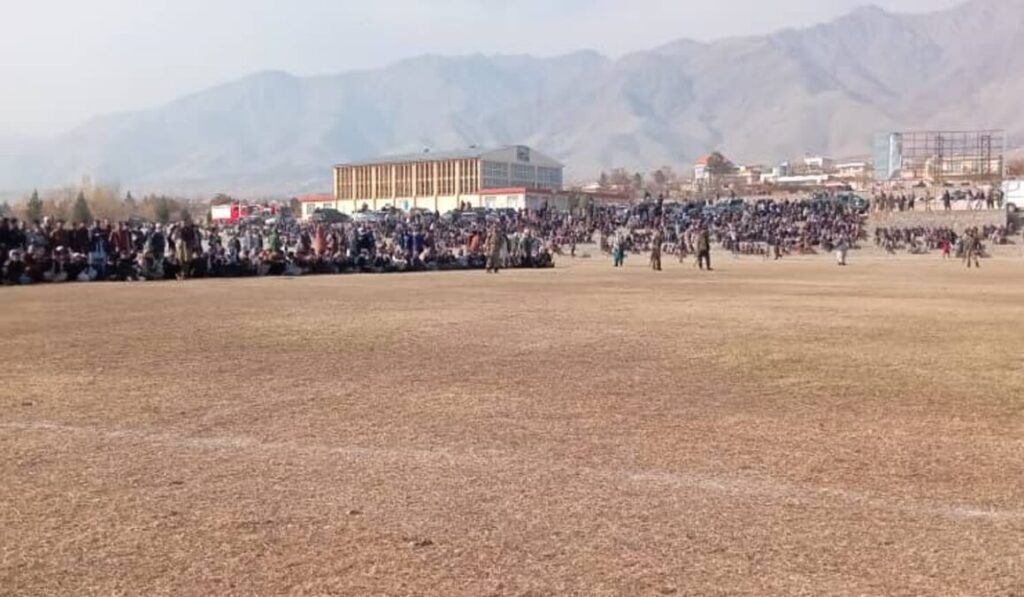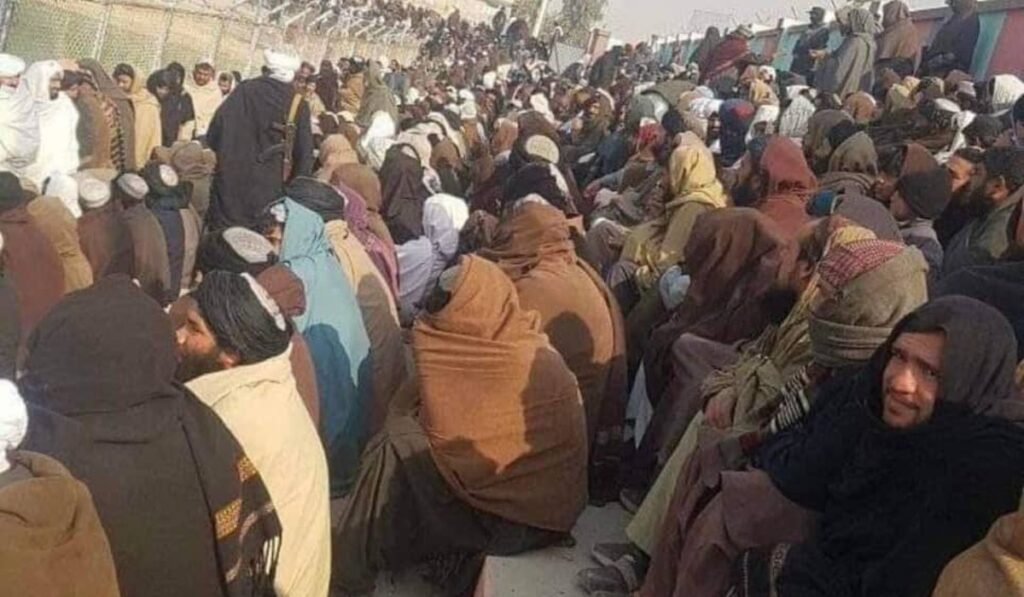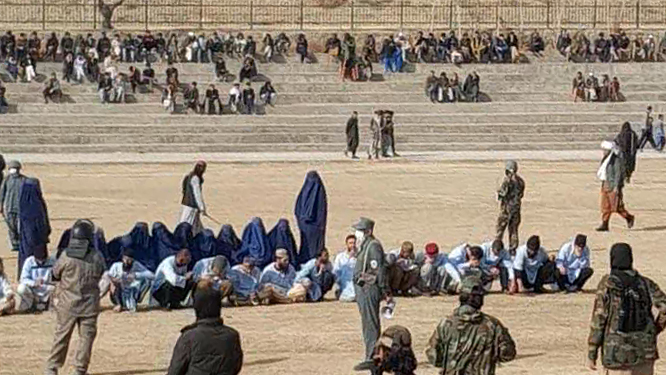The United Nations said in a report released on Monday about corporal punishment and the death penalty in Afghanistan that 274 men, 58 women and two boys were publicly flogged in the last six months in the country.
The United Nations Assistance Mission in Afghanistan (UNAMA) says it has documented a range of forms of corporal punishment carried out by the Taliban since 15 August 2021, including lashings/floggings, stoning, other types of beatings, forcing people to stand in cold water and forced head shaving.
“Corporal punishment is a violation of the Convention against Torture and must cease. The UN is strongly opposed to the death penalty and encourages the de facto authorities (Taliban) to establish an immediate moratorium on executions” UNAMA chief of human rights, Fiona Frazer, said.
Corporal punishment administered by Taliban authorities to date fall within three general categories:
Judicial corporal punishment, punishments carried out in accordance with a court decision.
Corporal punishment handed down by non-judicial de facto entities: punishments carried out following a formal decision announced by a non-judicial de facto authority member, i.e., a de facto Provincial Governor.
Ad hoc corporal punishment: punishments carried out by a non-judicial de facto authority member, in the absence of any formally announced decision i.e., de facto Police beating an accused person.
Between 15 August 2021 and 12 November 2022, UNAMA documented at least 18 instances of judicial corporal punishment carried out by de facto Provincial, District and Appeals Courts.
Ghor province had the highest number of recorded instances of judicial corporal punishment (6) during this period.
Within the 18 documented instances, 33 men and 22 women were punished, including two children (both girls).
The vast majority of punishments, for both men and women, related to zina, adultery or “running away from home” and all women and girls who were punished were reportedly convicted of such offenses.
Although details of the exact nature of these offenses under the current system is not known, under the Islamic Republic of Afghanistan, women and girls were routinely arrested for “runaway” or “attempted zina” after leaving homes without permission of their mahram (male guardian) or without providing information to their families about their whereabouts.

In general, punishments consisted of 30-39 lashes for each convicted person. In some cases, however, as many as 80 to 100 lashes were given.
From November 2022, there was a significant increase in both the number and regularity of judicial corporal punishment carried out by the Taliban. Between 13 November 2022 and 30 April 2023, UNAMA documented at least 43 instances of judicial corporal punishment. Within the 43 instances, 58 women, 274 men and two male children were lashed for a variety of offenses, including zina, “running away from home”, theft, homosexuality, consuming alcohol, fraud and drug trafficking. As before, the majority of punishments administered related to convictions of zina, adultery and “running away from home”.
Again, punishments consisted of 30-39 lashes per convicted person, however as many as 100 lashes were reportedly given in some cases.
UNAMA has recorded a number of incidents in which sentences of corporal punishment were handed down and imposed based on decisions by non-judicial Taliban members (including de facto District Governors, de facto Propagation of Virtue and Prevention of Vice officials, de facto Police and de facto General Directorate of Intelligence officials) “appearing to exercise a quasi-judicial function.” As with judicial corporal punishment, the most common crimes for which individuals were lashed were zina and “immoral acts”
As part of these cases, UN says that on 27 December 2021 in Baghlan province, Freng district, Moradi village, a 16-year-old girl and an 18-year-old man were arrested for zina and were lashed 50 times each, based on a decision by religious elders and de facto police.
On 9 July 2022 in Takhar province, Taloqan city, de facto Propagation of Virtue and Prevention of Vice and de facto General Directorate of Intelligence personnel publicly lashed eight women and five men for “immoral acts”. The lashing was not preceded by any formal court verdict or decision.
On 19 November 2022 in Nuristan province, Wama district, the de facto District Governor “convicted” a 17-year-old boy of stealing cooking oil and publicly lashed him 60 times. The decision was made following an interrogation of the boy, conducted in the presence of some Ulema.
UNAMA has documented numerous cases of ad hoc corporal punishment, carried out by the Taliban in the absence of any formal process or decision.
In most instances, these appear to be carried out by de facto officials of the Department for the Propagation of Virtue and Prevention of Vice (PVPV), against individuals accused of failing to observe various edicts, although instances of punishment perpetrated by other actors (such as de facto Police and de facto General Directorate of Intelligence officials) have also been recorded.
On 16 December 2022, in Baghlan province, Burka district, de facto military personnel lashed and beat two men with the butt of a gun, accusing them of gambling and using drugs, UNAMA says.
On 12 April 2022 in Helmand province, Lashkar Gah city, de facto vice and virtue officials slapped and kicked a group of shopkeepers, for allowing women to shop in their stores unaccompanied by mahram.
On 13 August 2022, in Bamiyan province, vice and virtue inspectors lashed two girls and one woman because they were not wearing burqas.
On 6 November 2022 in Kabul city, de facto PVPV officials detained a group of six young women and beat them with sticks and cables on their legs, because their ankles were visible under their dresses.
On 14 November 2022 in Helmand province, Lashkargah city, police stopped two adult men and beat them because they were playing music inside their car. In one instance, from Samangan province, a lashing by police resulted in the death of a woman.

On 30 November 2022 in Samangan province, Aybak city, police lashed a woman and a man who had been arrested on charges of adultery and “running away”. The woman died as a result of being beaten and her body was handed to her family the following day.
Death penalty
Since the Taliban takeover, UNAMA has recorded one instance of judicially sanctioned execution, which was conducted in public and in the presence of numerous, senior Taliban officials.
The death penalty happened in Farah province on December 7. The individual had been convicted of stabbing and killing a man in 2017.
One other instance of execution ordered by non-judicial actors has been recorded by UNAMA.
On 14 February, in Badakhshan province, Nusay district, the de facto District Governor ordered and implemented the stoning of a woman and man accused of adultery.
Taliban district governor reportedly gathered local residents, Ulema and other de facto authorities to participate in the stoning of the two individuals, who had been arrested the day before.
He reportedly stated he carried out the punishment “in accordance with Sharia law”.
In March 2022, there were reports that de facto authorities in Kunduz intended to execute four males accused of killing a group of eight polio vaccinators a few weeks earlier. The execution was reported to be a Qisās punishment, carried out in accordance with the wishes of family members of the victims. At least three of the four accused were under the age of 18. Family members and defense lawyers were denied access to the accused, who were held by de facto General Directorate of Intelligence. The execution was not subsequently carried out.
UNAMA has also recorded instances of corpses of alleged criminals, killed by de facto security forces, being publicly displayed, mostly in Herat province. For example, on 16 March 2022, de facto General Directorate of Intelligence officials rescued a 6-year-old child who had allegedly been kidnapped, killing one of the accused kidnappers in the course of the operation. His body was hung in a square in the center of the city. At least seven such instances have been recorded in Herat since 15 August 2021.
International courts have taken the view in some cases that the suffering caused to family members as a result of the treatment of their relative’s corpse post-mortem may be regarded as reaching the threshold of inhuman or degrading treatment,77 where the suffering caused is distinct in nature from the distress or sorrow caused by the death itself
UNAMA says that corporal punishment, defined as any punishment in which physical force is used and intended to cause some degree of pain or discomfort, however light, is a violation of the prohibition on torture and is contrary not only to Afghanistan’s human rights obligations, but also to a fundamental principle of international law.





